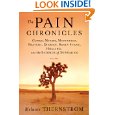Dealing with Pain
September 29, 2011
I recently got over a bout of cellulitis and it brought new meaning to a book I finished a few months ago: The Pain Chronicles by Melanie Thernstrom.
Cellulitis is an inflammation or infection that can settle in a joint and cause severe discomfort until you convince it to leave. I had gradually increasing pain for three days, and couldn’t even walk for a few more, before my crack medical team figured out the problem.
The point is not my problem, but the pain. After just a few days of it, I found new insight into the observations made by Ms Thernstrom and while I would have recommended her book anyway, I would now suggest it as required reading.
If you have ever been in pain, have a friend pain, or think you may ever be in pain, I would suggest you read this book. It really focuses on chronic pain, which is anything older than 6 months, according to medical professionals, but it will give you some insight into what’s going on. I have dealt with this kind of issue in past posts, but Ms Thernstrom does a much more thorough job.
It should also give you new empathy for folks, who have chronic back, knee, leg, neck or any other kind of pain but look perfectly healthy otherwise. Medical professionals know that pain is now recognized as it’s own disease and needs to be treated separately.
As Ms Thernstrom can attest, it can cause both physical and physiological changes that are extremely difficult to reverse. Ms Thernstrom’s book is a first hand account of her own chronic pain and her attempts to deal with it. It is also a well-researched history of how society, since the ancient Greeks, have tried to deal with the concept.
Like many books written by journalists, it is easy to read, clear and lays out the issues in a logical progression.
As we all age, and encounter more and more aches and pains, in places we never knew existed, we need to understand what’s happening both physically and psychologically. Ms Thernstrom does not have all the answers and sadly, she cannot say that she found a magic cure, but she tried a number of techniques and she can at least maintain a ‘normal’ life – something that I found hard to consider as I dealt with my short battle with pain.
The book recently became available in paperback or, of course, as an e-book.
Thinking About the Brain and Pain
March 8, 2011
I’ve been doing a lot of thinking about the brain recently. If you’ve read any of my book review posts you know I have an interest in how the brain works and what makes us, us.
But, over the last three weeks there seems to be a convergence of sorts. Two weeks ago the Wisdom 2.0 Conference was held in Mountain View. Billed as conference seeking “deeper meaning” in the modern technology-rich age, the event focused on mindfulness and trying to get participants to ‘be’ present, rather than always looking to something in the future.
The speakers were among the biggest in the field. If you are not knowledgeable in the field, trust me, those in the know, such as my wife, told me the people on stage were the thought leaders. What was more interesting to me was the attendees – well over half the crowd was made up of coaches of one type or another.
There were a few physicians, a couple of psychologists and many practitioners of mindfulness, or meditation of other holistic practices, but the largest group seemed to be coaches.
A key focus of the event was the effect of mindfulness on the brain and the enhancement of cognitive abilities.
Around the same time several articles came out noting the impact of the brain on pain.
One of them suggested that a patient’s expectations would impact their pain level and that the expected outcome of a surgical procedure was affected by a patient’s psychological state. My wife, the pain psychologist, has been telling me this for years.
Then, last week I attended a meeting of the Northern California Association of Pain Psychologists to listen to a lecture by Dr. Sean Mackey of Stanford on what happens in the brain when we experience pain. I had recently finished Melanie Thernstrom’s “Pain Chronicles” which I found quite compelling so I thought lecture would be interesting. Plus my wife didn’t want to drive alone.
Dr. Mackey is head of the Stanford pain program and is known world wide for the studies they do trying to isolate how the bran processes pain and other emotions.
Finally, I was brought full circle back to the Wisdom 2.0 coference by a New York Review of Books article on V.S. Ramachandran’s The Tell-Tale Brain: A Neuroscientist’s Quest for What Makes Us Human , which asks the question: If we know how the brain works does that really help us understand the human mind? And further, what implications does this have for coaching, management, or psychology.
I’m not sure what all this means but it seems clear the topic is pretty hot.
Think about it and let me know what you think.
